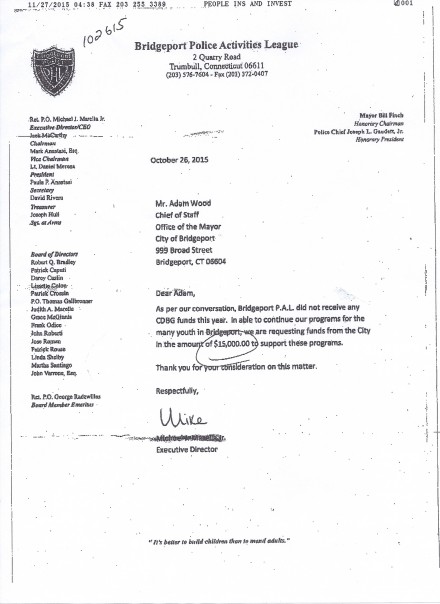Citizen fiscal watchdog John Marshall Lee raises a question, What happens when City custodians and fiduciaries fail to protect public funds and property? As the Ganim administration prepares to take office Tuesday, Lee no doubt will continue to review purchase orders to see who’s getting paid and asking why. His latest commentary centers on a city councilor supporter of outgoing Mayor Bill Finch requesting and receiving city funds on behalf of the Police Activities League weeks before leaving office.
Public safety officers arrest people from time to time who are in possession of money, weapons, drugs and/or stolen property. When they are processed that property may be set aside as evidence, identified as such, and placed under secure lock and key. Custody of such property is the responsibility of an officer who understands such property is held until a court of jurisdiction provides direction to the police when and to whom to release it. Police officers know these items are not available to police personnel for personal use or taking. Such behavior would be illegal. Taking such property is a criminal act, to be prosecuted if such person is caught. Investigations precede findings including arrests and there is such an investigation ongoing at this time.
In similar fashion, taxpayers provide revenues to the City trusting the funds will be explicitly and solely used to fund approved budget items. Those dollars of revenue flow per City process to cover valid payroll, employee benefits, for purchasing property and services contemplated in departmental budgets. They are secured through following effective routines requesting funds for purchases yet to be made (rather than reimbursement after the fact) and after bidding procedures that assure the City is spending no more of taxpayer funds than necessary. City employees in the fiscal chain of command are expected to know the rules so as to regularly abide by them and to follow those rules even when time pressures arise.
When public money is directed by a high-ranking City employee to personal use or benefit of an individual or group through issuance of a City check without an expressed departmental objective or commitment and without a City Council approval, are we viewing a criminal act? Is such an act, no matter the size of the amount, an unlawful taking of public funds or property? And when such is discovered, who is the proper party to investigate and report findings to? What redress can the public expect so as to recover value and to assure a single act does not provide precedent in the future? What do we call this behavior? How are taxpayers protected from this behavior today and into the future?

Michael Marella, exiting City Council person where he co-chaired the Budget and Appropriations Committee for the past two years wrote a letter on Bridgeport Police Activities League dated October 26, 2015 to Adam Wood, assistant to Mayor Finch. The letter requested $15,000 of City taxpayer funds because his program failed to receive a competitive Community Development Block Grant this year. (Bridgeport PAL was prevented from being a recipient of these Federal funds because of his position on the Council simultaneous with his being the program director. Federal “conflict of interest” rules are significantly different and stronger than whatever serves to control such conflicted behavior in Bridgeport.) Marella is a retired police officer and has been Executive Director of Bridgeport Police Activities League for many years. The City of Bridgeport processed a purchase order from the Office of Policy Management as a “non-biddable miscellaneous item” indicating “supportive contributions toward Bridgeport Police Activities League activities for youth programs 2015-16” though no evidence of what programs or how many youth were to be served. A check for $15,000 was fulfilled on November 16, 2015.
This is not the first time members of the City Council have participated in requesting or directing taxpayer funds without public notice, process, or approval to local charities. In 2013 nearly $30,000 was directed by 15 Council members through over 50 purchase orders. Necessary funds for programs for the more than 20,000 school-age youth are both necessary and critical. Lighthouse and other major providers of such programs including Bridgeport PAL need to provide more information about the efficiency and effectiveness of the dollars they have been provided from public sources, local, State and Federal. Where is regular oversight and reporting to the public provided today? Was the recent request for City funds supported by a vote of the members of Bridgeport PAL Board of Directors? If Internal Affairs is investigating the “disappearance” of funds in the Police safe, who is authorized and directed to investigate this illegal “removal of taxpayer funds from the City budget?” What role will Ed Adams and a potential “public integrity” committee sometimes discussed by incoming Mayor Ganim have in reviewing these types of City issues and providing satisfactory answers to the taxpaying public? Time will tell.


JML, I want to address the money spent by the council that in my opinion was illegal. We have the same Mike Marrella voting funds ($1,000) for the senior citizen marching band he belongs to, you have Paniccia doing the same thing, $1,000. Then we have Mike Marella’s nephew Rich Paoletto ex-councilman voting $1,000 to PAL, uncle Mike’s gig. We have two council people charging their groceries from Stop & Shop to the council account (57) times. We have council people charging their cable bills to the council account. This was all done with the approval of council president Tom McCarthy.
The council does not care about how city taxpayer money is spent, that is evidenced by what happens at budget hearings.
Paging Mr. Flatto.